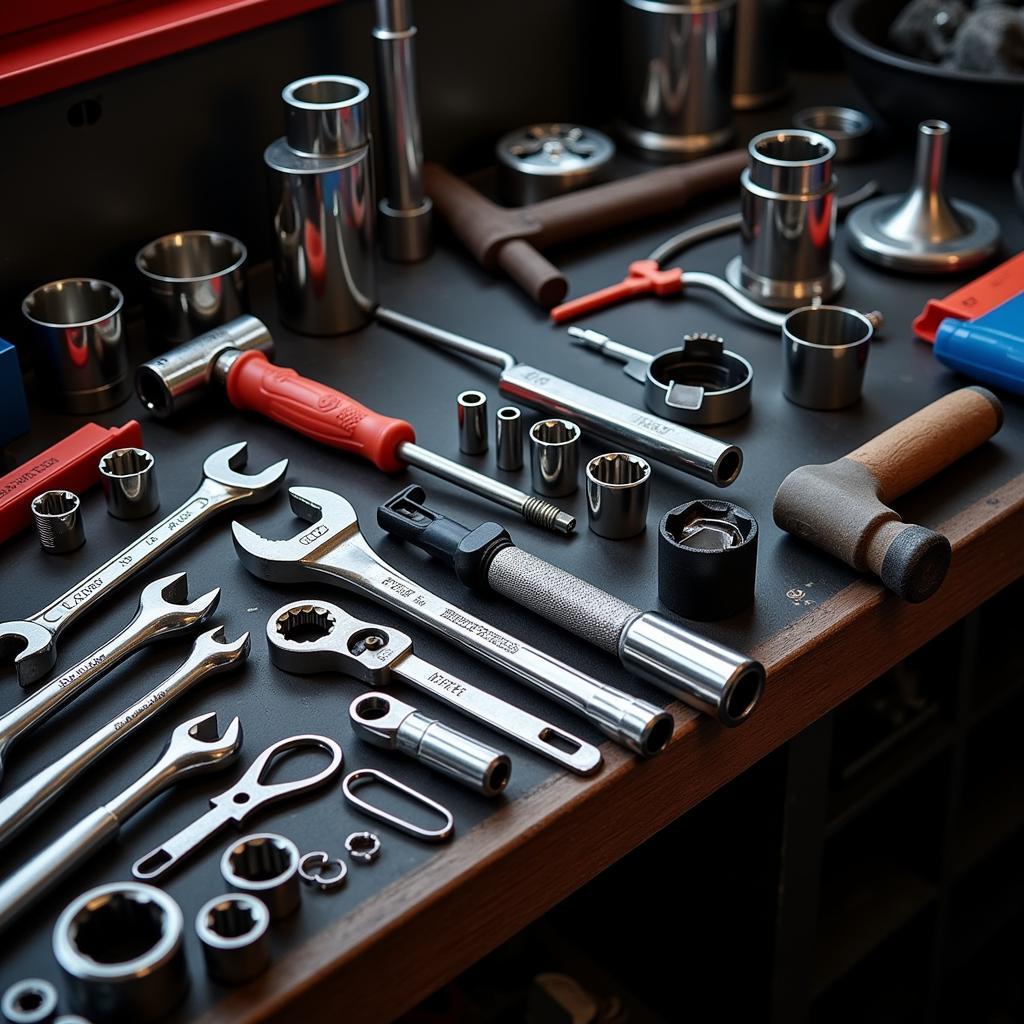A car mechanic’s toolbox is their sanctuary. It’s more than just a collection of wrenches and screwdrivers; it’s a carefully curated arsenal of tools that empowers them to diagnose, repair, and maintain vehicles. So, how many tools do you really need? Let’s dive in.
 Essential Car Mechanic Tools Displayed on a Workbench
Essential Car Mechanic Tools Displayed on a Workbench
Basic Hand Tools: The Foundation of Your Arsenal
Every mechanic, from DIY enthusiasts to seasoned professionals, needs a core set of hand tools. This includes various sizes of wrenches (both metric and standard), screwdrivers (Phillips and flathead), pliers, sockets, and a good quality hammer. These tools form the backbone of any mechanic’s toolkit and are essential for everyday tasks. Having a complete tool kit for car mechanics is crucial for efficiency.
Why are basic hand tools so important?
Imagine trying to loosen a bolt without a wrench or remove a screw without a screwdriver. Impossible, right? Basic hand tools are the building blocks for more complex repairs. They are the go-to tools for simple tasks and often the first point of contact when diagnosing a problem.
Diagnostic Tools: Unveiling the Mysteries Under the Hood
In today’s technologically advanced vehicles, diagnostic tools are no longer a luxury but a necessity. These tools, ranging from simple code readers to sophisticated scan tools, allow mechanics to pinpoint problems quickly and accurately. They provide insight into the inner workings of a vehicle’s electronic systems, making troubleshooting much more efficient. Understanding the cars diagnostic tool difficulty can be crucial in selecting the right tool.
What kind of diagnostic tools do you need?
The specific diagnostic tools you need depend on the type of work you do and the vehicles you work on. A basic OBD-II code reader can be sufficient for DIY enthusiasts, while professional mechanics may require more advanced scan tools with bidirectional capabilities. Choosing the right diagnostic tool is like choosing the right magnifying glass – it can make all the difference in seeing the details clearly.
Specialized Tools: For the More Demanding Jobs
Beyond the basics, certain specialized tools are required for specific tasks. This might include portable car alignment tools for suspension work, brake bleeding kits, or timing light tools. These tools are often task-specific and may not be used every day, but they are invaluable when needed. Sometimes, you need an extension tool car to reach those difficult spots.
When do you need specialized tools?
Specialized tools come into play when dealing with more complex repairs or specific vehicle systems. For instance, working on a car’s braking system requires specialized tools like brake bleeding kits and line wrenches. Investing in specialized tools expands your capabilities and allows you to tackle more challenging jobs.
Building Your Tool Collection: A Journey, Not a Destination
Building a comprehensive tool collection is an ongoing process. Start with the essential car mechanic tools and gradually add more specialized tools as your skills and needs evolve. Don’t feel pressured to buy everything at once.
“A good mechanic knows their tools like a surgeon knows their scalpel,” says John Davis, a veteran mechanic with over 25 years of experience. “It’s about quality, not quantity. Invest in reliable tools that will last.”
Conclusion: How Many Tools Do You Really Need?
The number of tools a car mechanic needs isn’t a fixed number. It’s a dynamic collection that grows and adapts with your experience and the demands of your work. Start with the basics, prioritize quality over quantity, and gradually expand your toolkit as you encounter new challenges. Remember, a well-equipped toolbox is an investment in your success as a car mechanic.
FAQs
- What are the most essential hand tools for a beginner mechanic?
- What is the difference between an OBD-II code reader and a scan tool?
- When should I invest in specialized tools?
- Where can I find reliable and affordable tools?
- How do I maintain my tools to ensure their longevity?
- What are some common mistakes to avoid when using car mechanic tools?
- Are there any online resources for learning more about using specific tools?
You can find additional helpful information on our website related to choosing the best car mechanic tools for your needs.
For further assistance, contact us via WhatsApp: +1(641)206-8880, Email: [email protected], or visit us at 910 Cedar Lane, Chicago, IL 60605, USA. Our customer service team is available 24/7.

Leave a Reply